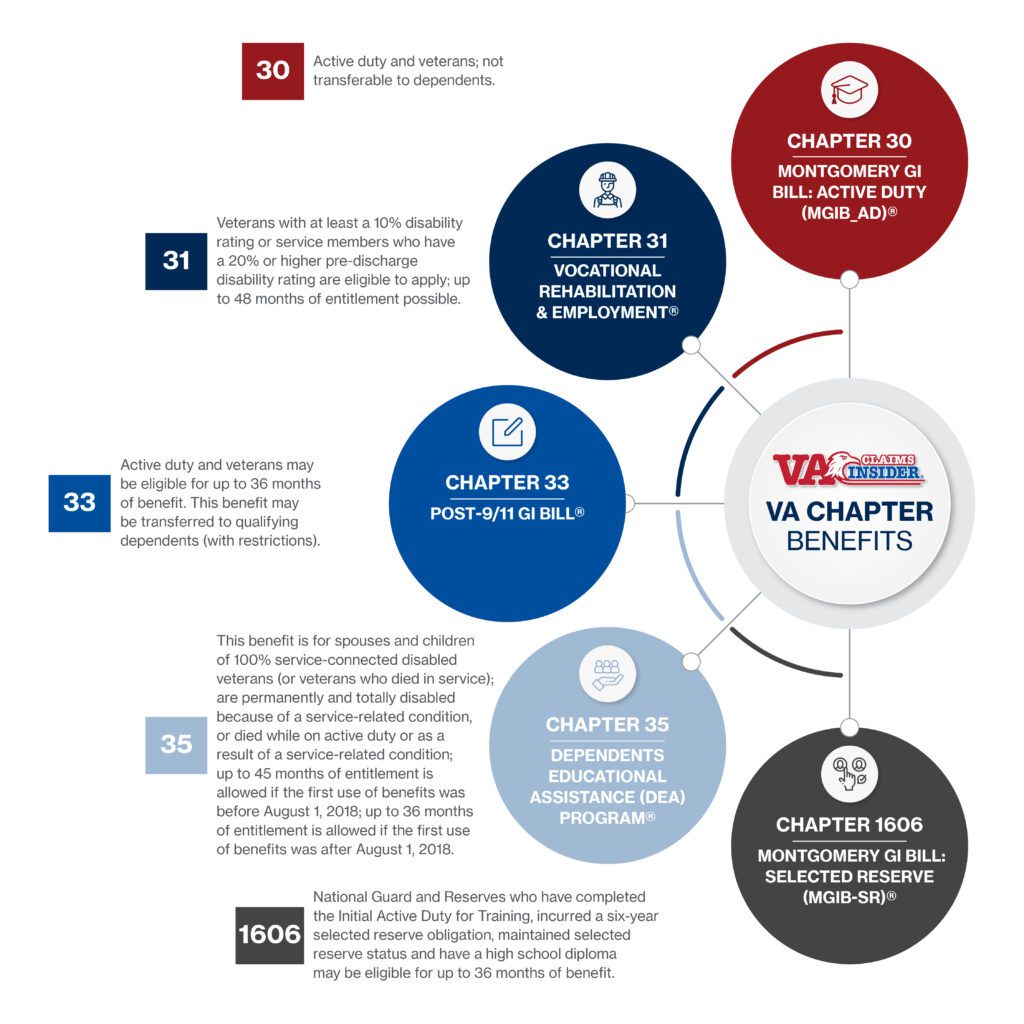Looking for Expert-Level VA Claim Answers?📱Call Us Now! 737-295-2226
Veteran Education Benefits
If you’re a veteran, you may be eligible for Veterans Education Benefits through the VA.
We want to ensure you have all the information you need to make an informed decision about your education benefits.
We’ve put together this guide on Chapter 31 VA Benefits to help you understand if you qualify for these education benefits. Here you’ll find information on eligibility requirements, how to apply for benefits, and what kind of benefits you can receive.
We hope this guide will help you take advantage of the education benefits available and help you achieve your educational goals.
Table of Contents

You DESERVE a HIGHER VA rating.
Take advantage of a VA Claim Discovery Call with an experienced Team Member. Learn what you’ve been missing so you can FINALLY get the disability rating and compensation you’ve earned for your service.
What is the VA Vocational Rehabilitation and Employment Program (Chapter 31 VOC Rehab)?
The VA Vocational Rehabilitation and Employment Program (also referred to as VR&E, the Chapter 31 program) is an excellent resource for disabled veterans with a service-connected disability.
The program provides job counseling, job search assistance, and on-the-job training to help veterans find employment.
Additionally, the program offers education and career development services to help veterans transition to civilian life.
Veterans can also receive financial assistance for school or training programs. The VA Vocational Rehabilitation and Employment Program is a great way for veterans to get the skills and training they need to find successful careers.
Chapter 31 VA Benefits Eligibility
Veterans who have service-connected disabilities are eligible for Chapter 31 VA benefits. These benefits include educational assistance and vocational rehabilitation.
Additionally, the VA website states that “Veterans participating in the VR&E program MAY receive a subsistence allowance while they pursue an educational or training program in preparation for a future career.”
This stipend is based on attendance in a training program (full-time, three-quarter time, or half-time), the number of dependents, and the type of training. You can use the educational assistance for tuition, books, and other expenses.
To be eligible for Chapter 31 benefits, veterans must meet both of the following requirements:
- you didn’t receive a dishonorable discharge,
- and you have a service-connected disability rating of at least 10% from VA.
Veterans discharged from active duty before January 1, 2013, have a basic period of eligibility that lasts 12 years. This period begins on the date that the veteran received notice of their date of separation from active duty or the date on which they received their first VA service-connected disability rating.
If you were discharged from active duty on or after January 1, 2013, the 12-year basic eligibility period doesn’t apply to you. There’s no time limit on your eligibility.
What Disability Rating Do I Need to Be to Qualify for Chapter 31?
While the specific requirements vary from state to state, if you are a veteran, you must have a service-connected disability rating of at least 10% with a serious employment handicap (SEH) or 20% or more with an employment handicap to qualify for Chapter 31 benefits.
In addition, you must be able to show that your disability is preventing you from being able to work or pursue vocational training. If you meet these requirements, you can begin working with a Vocational Rehabilitation Counselor to develop an individualized plan for achieving your employment goals.

What are the VA Benefits of the Veteran Readiness and Employment Program (VR&E)?
The VA’s VR&E program is designed to help service members who have service-connected disabilities prepare for, find, and keep suitable jobs.
The program offers a wide range of services to eligible veterans, including:
- Vocational counseling: Individualized counseling and guidance help veterans choose a career path best suited to their skills, interests, and abilities.
- Job training: On-the-job training, apprenticeships, and non-paid work experiences can lead to employment.
- Education benefits: Payment for tuition, fees, books, and other necessary education-related expenses at approved colleges and universities.
- Other services may include: resume development, other work-readiness support, help finding and keeping a job, including the use of special employer incentives and job accommodations, post-secondary education and training at a college, vocational, technical, or business school, Supportive rehabilitation services including case management, counseling, and medical referrals and independent living services.
What Is the Chapter 31 VA Benefits Pay Scale
The VA offers various options when it comes to getting the most out of your education and training benefits.
With the VA’s comparison tool, you can see how different benefits stack up against each other. So whether you’re looking for the most bang for your buck or the best possible education, the VA has you covered.
You can find out how to calculate your possible subsistence allowance rates here.

Can a Veteran Get Multiple Degrees With Chapter 31?
Under the previous interpretation of the “48-month rule,” veterans who used VR&E benefits first would only be able to use 36 months of other educational assistance benefits.
Since 2021, with the updated interpretation, veterans can use up to 48 months of benefits total. This change will help veterans get the most out of their education benefits and better support their success in achieving their goals.
If you’re a veteran with a service-connected disability, you may be wondering if you’re entitled to additional education benefits.
It may be possible for entitlement used in a VA education program to be reclassified as entitlement used in VR & E, which could result in additional entitlement to other VA education programs.
It’s important to note that this process is very limited and restricted by law and regulation; not every veteran with a service-connected disability will qualify for retroactive induction. But if you think you might be eligible, it’s worth looking into.

What Is the Difference Between Chapter 31 and the GI Bill (Chapter 33)
Potential students should know the key differences between Chapter 31 and the Post-9/11 GI Bill (Chapter 33).
Chapter 31 is available to veterans with at least a 10% disability rating, but approval is not guaranteed. Up to 48 months of entitlement are possible.
Chapter 33, on the other hand, is available to active duty and veterans with no minimum disability rating. You may transfer this benefit to qualifying dependents with some restrictions. Up to 36 months of entitlement are possible.
The Post-9/11 GI Bill is more widely available and has more flexible eligibility requirements. As such, it is often seen as the superior option for those looking to take advantage of their educational benefits.
Does Chapter 31 Take Away From Chapter 33?
There’s a lot of confusion out there about veterans’ education benefits. Some people think that if you use Chapter 31 benefits, you can’t also use Chapter 33. But that’s not true!
Chapter 31 is specifically for vocational rehabilitation, while Chapter 33 is for the Post-9/11 GI Bill.
You can use both benefits at the same time. Chapter 31 can help you cover the cost of tuition, while Chapter 33 can cover things like your monthly housing allowance and book stipend.
Do all schools accept the GI Bill and Chapter 31?
If you’re interested in using your benefits to attend school, you’ll need to find a GI Bill-approved school. You can use this comparison tool to find schools and compare benefits. The tool will help you get more advice on choosing the right school.
You’ll be able to click on each school to learn more about the benefits they offer, as well as compare the benefits of each school side-by-side to help you make an informed decision.
We hope this guide has been helpful. We’re insiders and here to walk you through everything you need to know. Remember, if you have any questions about Veterans Education Benefits, we encourage you to contact us for support.
Related Resources
Trade Schools That Accept the GI Bill

Want Expert-Level Support With Your VA Claim? WE GOT YOUR SIX!
How does VA Claims Insider help veterans?
We make the confusing and frustrating VA claim process EASY through our 8-step proprietary system and one-on-one coaching; we’re the VA Claim EXPERTS you can trust, and YOU are never alone in this fight against the VA!
You’ll also receive VA disability expert Brian Reese’s SEM Method Blueprint—a proven formula that has helped over 25,000 veterans win their VA disability claims faster:
Strategy + Education + Medical Evidence = VA Rating and Compensation You Deserve FASTER!
Start today and unlock an exceptional level of service you deserve for serving our country:
- You’ll hear from a VA Claim Expert over email within 15 minutes of signing up today.
- You’ll hear from your Veteran Coach team within 24 hours of all inquiries during normal business days/hours.
- Our terms are simple: IF WE DON’T WIN, YOU DON’T PAY. You have nothing to lose and everything to gain!
Click the red button below to start the process of winning your VA claim right now:
About VA Claims Insider
- 4.7/5.0 average rating out of 5,500+ total reviews; over 4,500 5-star reviews.
- VA Claims Insider is the #1 most trusted name in VA disability claims.
- Work directly with a VA claims coach who can help lead you to VA claim victory.
- 25,000+ disabled veterans served in our membership programs since 2016.
- 30% average rating increase for veterans who complete our #1 rated Elite program.
About the Author

Brian Reese
Brian Reese is a world-renowned VA disability benefits expert and the #1 bestselling author of VA Claim Secrets and You Deserve It. Motivated by his own frustration with the VA claim process, Brian founded VA Claims Insider to help disabled veterans secure their VA disability compensation faster, regardless of their past struggles with the VA. Since 2013, he has positively impacted the lives of over 10 million military, veterans, and their families.
A former active-duty Air Force officer, Brian has extensive experience leading diverse teams in challenging international environments, including a combat tour in Afghanistan in 2011 supporting Operation ENDURING FREEDOM.
Brian is a Distinguished Graduate of Management from the United States Air Force Academy and earned his MBA from Oklahoma State University’s Spears School of Business, where he was a National Honor Scholar, ranking in the top 1% of his class.




